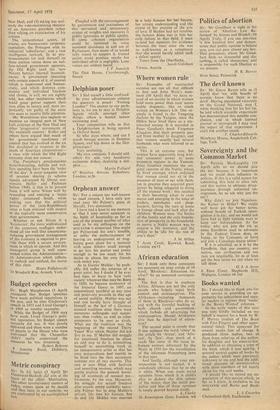Orphean answer
Sir: For a reason too well-known to need remark, I have only just read your Mr Palmer's piece (6 March). Two comments.
I have tied a knot in my memory so that I may never succumb to the habit of hospitality as far as any of the present number of what used to be my colleagues on the SPECTATOR is concerned. One might get Palmerised for one's trouble, or suffer the embarrassment of leaving an underground or trog- lodyte guest alone for a moment with some bibelot small enough to go into his pocket and pretty enough to be too much for his desire to please his own friends with stolen joys.
As to Gustav Mahler: he prob- ably did suffer the miseries of a great artist, but I doubt if he ever had time to learn to hate 'café society' whatever that may be. Born in 1860, he became conductor of the Imperial Opera in 1897, an appointment youthful at any time and positively juvenile in that age of social stability. Mahler was not and can hardly have thought of himself as the last of a German musical tradition since there were numerous colleagues and succes- sors then visible, as well as other composers to be seen as rivals. What cut the tradition was the beginning of the second Thirty Years' War which Mahler did not live to see. If Mahler did struggle for emotional freedom he chose an odd way to do it, committing himself to unremitting work as an interpretative artist so that his own compositions had mainly to be fitted into the then customary summer rest of two months. This rest is now filled with festivals and recording sessions, which may partly explain the general lower- ing of standards of musical per- formance, by the way. Moreover, his struggle for sexual freedom also sounds pretty unlikely; natur- ally Palmer has to drag Mahler's private life into his fantasy, but in real life Mahler was married to a lady famous for her beauty, her artistic understanding and the extent of her practice of the arts of love. If Mahler had sex troubles the famous Alma met in him her only failure in that field; I must re-read her memoirs for evidence between the lines since she was so well-known as a voluptuary that she would hardly admit such a defeat openly.






































 Previous page
Previous page